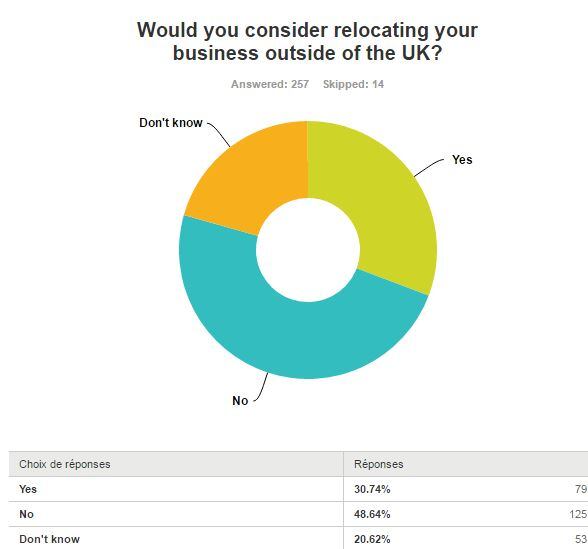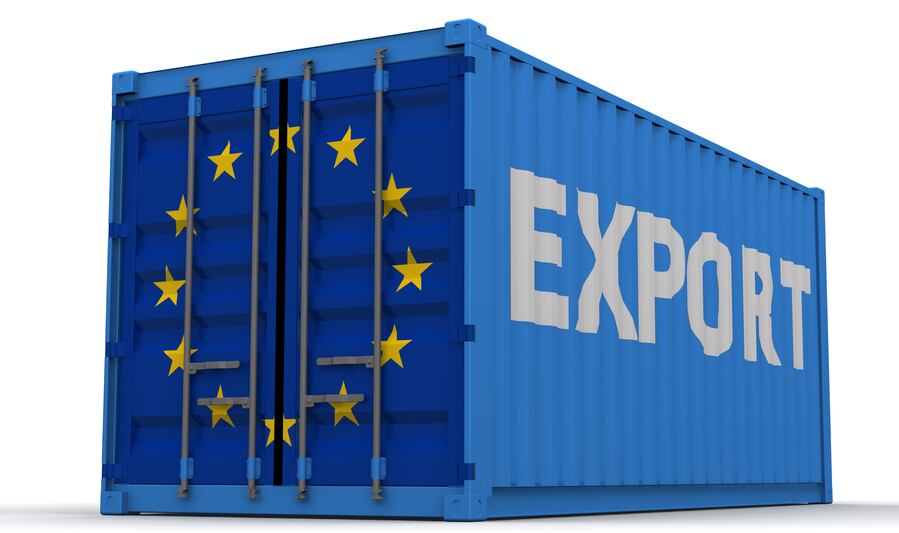The majority of FoodNavigator readers feel negatively about the UK’s decision to quit the European Union – to the extent that almost one third (31%) would consider moving their operations outside the UK.

There were diverging opinions, but when asked if they saw any opportunities arising out of Brexit, most readers replied with a flat “No” (and one spirited “NO!!!!”) while 75% either strongly agreed or agreed that food prices in the UK will rise as a result.
The answers ranged from the bitingly cynical - “The dumb politicians and the even dumber electorate have decided that they want the UK to be a basketcase” – to the philosophical. “Change releases energy,” wrote one reader simply.
Meanwhile one respondent, who completed the survey six days after B-day and around a week before the government announced Brexit will indeed happen and that there will be no second referendum, was in denial. “Brexit will not happen. Five million Brexit voters and UK MEPs will review every possible opportunity to stay in the EU.”
Who took part in our survey?
Over one fifth (23%) of comments came from companies with over 1000 employees while 43% came from SMEs with less than 50.
One quarter of respondents work in general management; 15% in sales and business development; 12% in R&D; 8% in administration and finance.

Most people – around 60% - did not think Brexit will free the UK from EU red tape but around 29% did.
“[Brexit will mean] less time spent in Brussels fighting against legislation to which no country can apply and work to. Hopefully a lot more UK style common sense being applied. Overall a saving in totally unnecessary costs,” wrote one reader.
Just under half (49.4%) of respondents said they now expected to face disruptions in their firm’s supply chain compared with 37% who either disagreed or strongly disagreed with this and nearly 14% said they didn’t know.
Readers were fairly confident that the UK will continue to apply EU food, beverage and feed legislation – which would probably make for a much easier transition given that, according to some estimates, around 98% of UK food law is based on EU legislation.
In total, 71% of those surveyed either agreed or strongly agreed that EU food law would continue to be used while a more doubtful 15% did not.
Would Brexit mean watered-down safety standards? Most readers were confident that a post-EU UK would continue to have strong food safety with just under one quarter (24%) thinking safety would be watered down while around 65% did not.
One reader predicted: “ A more reasonable approach to food legislation without compromising on Food Safety. […] In the EU we tend to overregulate without any clear benefit for consumers but instead unnecessary use of resources (human and monetary) which increases price pressure, puts pressure on competitiveness and hampers innovation. Brexit also may mean even closer ties between UK and USA.”
Trade and sales
The impact on trade is a worry for many - not surprisingly given that 44% of total UK exports (worth £223 billion, or €263 bn) went to the EU in 2015 while UK imports from the EU were worth £291.1 bn (€344 bn), according to the Office for National Statistics.
One respondent put it rather succinctly: "Smaller market, smaller business."

Most respondents were either pessimistic about consequences for trade - 46% said their business would face significant EU tariffs - or uncertain.
“[It’s] difficult to say today," said one reader. "It will depend on how the EU-UK trade agreements will [be] reset,” said one reader, echoing the feelings of more than a quarter of those surveyed who said they didn’t know what the impact would be.
Nevertheless, several readers said Britain would now to free to negotiate trade deals with markets outside the EU, with some pointing specifically to North America and the Far East.
Less than half (46%) said they thought that Britain's departure from the Union of over half a billion potential consumers would result in lower sales volumes for their company compared with 35% who disagreed. But almost one fifth (19%) were unsure either way.
One reader on the other hand was seeing a positive impact on sales due to the sterling pound's fall in value. "With the devaluation of the pound we are seeing more enquiries due to the discounted price of top tier equipment."

Meanwhile some sectors are expecting to be impacted positively by the confusion and uncertainty.
"Yes, [I see] a great many [opportunities] - business planning in particular!,“ said one, while another reader predicted: "[an] increase in requirements for advice after Brexit becomes a reality”.
Investment and employment
Last week, director general of the UK’s food and drink association, Food and Drink Federation, Ian Wright said he wanted “cast iron” assurances from the British government that steps would be taken to ensure manufacturers would retain a flexible workforce - 26.9% of UK’s food factory workforce is from EU – and this has been flagged as a massive potential problem.
But while 47% did say they thought Brexit will result in difficulties sourcing unskilled labour, a fairly high 37% disagreed and 16% said they did not know.
